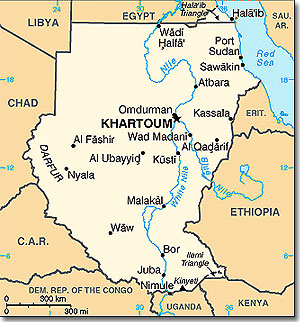Untitled Document

A Darfur baby burned in a bombing raid
Dick Cheney painted for Air Force Academy grads what the Washington Post this
morning called a "sober and tough-minded portrait of the mission ahead"
in the hunt for terrorists:
"We will not sit back and wait for future attacks. We will prevent those
attacks by taking the fight to the enemy."
Actually, we're continuing to cozy up to several enemies. Cheney's company Halliburton
is trading with one enemy, Iran, which also does business with ABB, the Swedish
megaconglomerate. Cheney's pal Don Rumsfeld was on the ABB board when it sold
two nuclear reactors to another enemy, North Korea.
As usual, Cheney just dipped into his familiar palette of oils for the hardline
speech to the Air Force Academy grads. He brushed out the background of our
hypocritical buddy-buddy act with yet another enemy, Sudan, ruled by the brutish
Omar Hassan al-Bashir. Last September, Colin Powell, testifying in front of
the Senate Foreign Relations Committee, put the official label of genocide on
the Darfur horrors of death and starvation. As the BBC reported at the time:
Mr. Powell blamed the government of Sudan and pro-government Arab Janjaweed
militias for the killings.
"We concluded that genocide has been committed in Darfur and that the
government of Sudan and the Janjaweed bear responsibility and genocide may still
be occurring," Mr. Powell said.
Mr. Powell's conclusion is based on evidence collected by state department
investigators, who interviewed more than 1,800 refugees.
Their testimonies, Mr. Powell said, showed a pattern of violence which was
co-ordinated, not random. Three quarters of them said the Sudanese military
had been involved in the violence, working with the Janjaweed.

But under the blood-soaked sands of Darfur is oil, and Powell is no longer secretary
of state. You don't see the Blair and Bush governments plotting to justify a humanitarian
military intervention in that situation. No, we're playing footsie with Sudan's
genocidal regime, as Ken Silverstein of the Los Angeles Times reported from Sudan
in late April:
The Bush administration has forged a close intelligence partnership with the
Islamic regime that once welcomed Osama bin Laden here, even though Sudan continues
to come under harsh U.S. and international criticism for human rights violations.
The Sudanese government, an unlikely ally in the U.S. fight against terror,
remains on the most recent U.S. list of state sponsors of terrorism. At the
same time, however, it has been providing access to terrorism suspects and sharing
intelligence data with the United States.
[In late April], the CIA sent an executive jet to ferry the chief of Sudan's
intelligence agency to Washington for secret meetings sealing Khartoum's sensitive
and previously veiled partnership with the administration, U.S. government officials
confirmed.
Digression: Did I mention that Halliburton does business with still another
brutish (there's that word again) ruler, Uzbekistan's Islam Karimov, under whom
prisoners are boiled to death, and that we send "war on terror" prisoners
there to be interrogated? Or that we're eager to sell Lockheed F-16s to still
another dictator, Pakistan's Pervez Musharraf, who long ago gave up helping
us hunt for bin Laden?
Back to Sudan: Cheney's by-the-numbers rendition in Colorado Springs ignored
the sketchy details of how we ourselves long ago gave up an all-out hunt for
bin Laden, whom Sudan harbored, to unjustifiably invade oil-soaked Iraq and
liberate Halliburton. Fighting over oil is what motivates the Bush regime's
neocon artists. Now, the scene is shifting to Africa.
Federico Bordonaro, a Sorbonne scholar, captures that landscape perfectly in
"The Darfur Question at a Time of Increasing U.S.-China Competition,"
a new piece for the Power and Interest News Report:
Today's American and Western attention for the Darfur question has much to
do with Khartoum's new commercial and political ties with Iran and—especially—
China. Beijing's attempt to gain influence in Africa is in fact one of our age's
geopolitical novelties. Its main goal is to acquire African oil and gas at favorable
conditions, in regions where Western oil majors must still compete for total
control. Beijing's new African policy has been focused on Gabon, Nigeria, and
Sudan. It must be said, for the sake of accuracy, that Sino-Sudanese relations
are not entirely new, for the arms trade between the two countries has been
in place since the late '60s.
Control over oil reserves is at the top of China's wishes—and Sudanese
diffidence for the U.S. seems to be a good set-up for Chinese penetration as
a power broker. In 2003, China's National Petroleum Corp. planned to invest
$1 billion to create Sudan's largest oil refinery. Moreover, as recent declarations
from Sudanese Minister of Energy and Mining Awad Ahmed Al-Jazz confirmed, a
newly discovered oil field expected to produce 500,000 barrels per day of crude
oil is located in the Darfur region. This latter is also the way to Chad, a
country well-known for its natural gas reserves.
Keep this in mind when you read about World Bank president Paul Wolfowitz's
sudden concern for Africa. On the other hand, "sober and tough-minded"
is what I'd call Bordonaro's shrewd estimate of the oil politics being played
in Africa:
At a time of growing strategic partnership between U.S. geopolitical adversaries
such as Iran and China, Sudan's importance is understandable in light of its
energy assets and strategic position to securitize the "Greater Middle
East."

